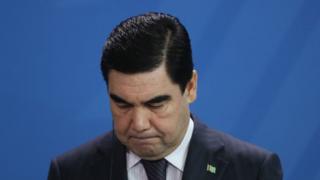How the rumour mill ‘killed off’ a president
Rumours about the death of presidents don’t normally live long. But in the Central Asian nation of Turkmenistan, one of the most secretive and closed states in the world, rumours are often the only source of information.
Over the weekend, regional news outlets and social media were caught up in an information storm following reports that the president of Turkmenistan, Gurbanguly Berdymukhamedov, had died.
A local Moscow radio station’s website and an opposition YouTube channel reported that he had died of a kidney failure. Their sources? Rumours.
A little-known pundit on Central Asian affairs, Aslan Rubayev, told Govorit Moskva radio that “people who informed me about it live in Ashgabat [Turkmenistan capital]. They’re businessmen”.
In most countries, these rumours would not go any further. But not in the case of Turkmenistan.
The dubious reports were quickly picked up by Russian media, including some mainstream networks like NTV. Discussions on social media went viral. But there was little to discuss.
Information is tightly controlled in Turkmenistan.
Reporters Without Borders ranked it as the second worst country in the world for press freedom, below North Korea in its 2019 report. All prominent social media networks in the country are blocked. All local media are state controlled. A handful of journalists who work for foreign media are constantly harassed and risk their lives for doing their work.
In such a situation when information is scarce, rumours (even bizarre ones) like the death of the president can spread like a wildfire. Digital technologies make them almost unstoppable.
President Berdymukhamedov is known for his ostentatious media appearances as a Rambo-like commander-in-chief, a DJ and a racing car driver.
He made a rap song about horses and has written a number of books on tea drinking, herbal medicine and other subjects. In one of the PR stints, he was even shown conducting surgery on a patient. And he is a dentist by profession.
The president apparently hasn’t been seen in public since 5 July. He didn’t even meet the EU’s foreign policy chief, Federica Mogherini, during her visit to the country’s capital a day later.
His disappearance and the total silence of Ashgabat has only fuelled the rumours.
State media have neither confirmed nor denied these speculations. Instead, they reported about the president’s address to mark a national day for health workers and repeated old reports about how Mr Berdymukhamedov was spending his vacation – writing yet another book while watching his own music videos.
It’s not surprising that the state media remained silent. The total control of information flow means that Turkmenistan doesn’t do live TV, organise press conferences or other events that would makes officials talk off the script. The press services of ministries don’t engage with media since these offices are mere bureaucratic tools in the propaganda machine.
Mr Berdymukhamedov’s presidency is officially called the era of Might and Happiness. State media never show reports about his critics who disappear in prisons or about massive food shortages and huge queues in shops.
Every piece of information must be confirmed by the authorities, so nothing can go out before the censors’ approval. In this delicate case, the approval had to come from the very top.
Ironically, it was the opposition website, Chronicles of Turkmenistan, that tried to refute the rumours. It suggested that the president had disappeared because his mother was seriously ill and had allegedly been taken to a hospital in Germany. It reported that the situation in Turkmenistan was calm, business as usual.
But the fact that things are as usual does not mean the rumours were false. The repressive state prevents any mass display of emotions without a sanction, whether it’s euphoria or panic. “People heard about the rumours but they’re afraid to discuss it,” one resident in Ashgabat, who managed to bypass the social media block, messaged me.
By Sunday evening, Turkmen officials in embassies in Russia, Kyrgyzstan and Tajikistan started to respond, telling journalists that the reports were “an absolute lie”. Their intervention perhaps prevented a major information collapse for the government.
Later, the Asian affairs pundit wrote that the information he had provided was not confirmed and apologised for misinforming the public.
But this is unlikely to stop the rumours completely.
In Central Asia, speculations of presidents’ death are not that unusual. Often, they turn out to be false… until the presidents really die.
When Islam Karimov, the ex-president of neighbouring Uzbekistan died in 2016, rumours about his death spread for almost a week before the official confirmation was made. The government’s initial denial was seen as an attempt to buy time to prepare power transfer.
So people do pay attention to news of leaders’ deaths in this region. Gossip usually cannot be totally dismissed until the leader is actually seen by the public alive.
Source: Read Full Article



